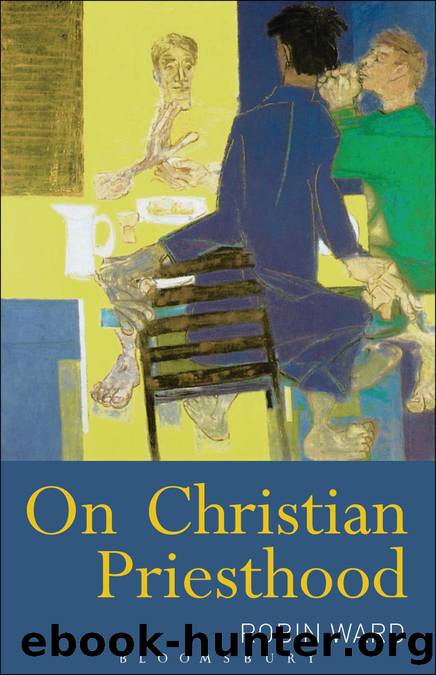On Christian Priesthood by Ward Robin;Ward;

Author:Ward, Robin;Ward;
Language: eng
Format: epub
Publisher: Bloomsbury Publishing Plc
Published: 2019-11-23T00:00:00+00:00
Christâs priesthood and Eucharist
If the letter to the Hebrews articulates a doctrine of Christâs priesthood which designates him as divinely appointed, consecrated by the Spirit to atone by virtue of his fidelity and definitively efficacious in the act of atonement itself, then the accounts of the Last Supper in the synoptic gospels provide the ritual setting for the sacrificial meal by which the high priest is to perpetuate the memory of the offering he is about to make. The institution of the Eucharist at the Last Supper takes place within the cultic setting of the Passover, and establishes in its place a new ritual commemoration of the covenant of God with humankind, one which is evidently already fundamental to the sacramental economy of the nascent Church by the time Paul has cause to write about abuses in its celebration to the Corinthians. How can the Last Supper institute the commemoration of an offering that is still to be made? Thomas Aquinas follows Innocent III in asserting that in the consecrated bread and wine of the Last Supper Christ bestowed on the disciples his body such as it was.4 There is no anticipation of the impassible resurrection body: although Christ as sacramentally present has no extension in space and so cannot experience the various incidents of the Passion visited upon him in proprio specie, yet had the sacramental presence first instituted at the Last Supper endured during the Passion, there would have been an actual separation of body and blood under the species of bread and wine, and no concomitant presence of Christâs human soul once it was divided from his body by death.
The alternative view which S. Thomas finds in Hugh of St Victor and which characterizes the approach of the Anglican Charles Gore5 is that the presence of Christ in the Eucharistic communion of the Last Supper is impassible and glorious by way of anticipation, just as at the Transfiguration a similar anticipation of the state of glory took place, and after the resurrection by contrast Christ though in no strict need of it submitted to the needs of mortal living by eating and drinking. Thomas denies this by reiterating that the body of Christ given in the Last Supper must be the body then perceptible to the disciples: passible with respect to its readiness to undergo the Passion, impassible only insofar as its dimensive state governed by the accidents of bread and wine excluded the infliction of suffering on that body sub specie sacramentis. However, even if the character of Christâs sacramental presence at the Last Supper is not an anticipation of the glorification of his human nature at the resurrection, the institution of the rite by which the sacrifice of the Cross will be commemorated is an anticipation of the atonement which this sacrifice will accomplish. Moreover the rite in itself is not one which anticipates a bloody sacrifice through any external resemblance: there is nothing in the Last Supper which by virtue of the act of celebrating it symbolises Calvary.
Download
This site does not store any files on its server. We only index and link to content provided by other sites. Please contact the content providers to delete copyright contents if any and email us, we'll remove relevant links or contents immediately.
The Hatha Yoga Pradipika (Translated) by Svatmarama(2498)
Real Sex by Lauren F. Winner(2481)
The Holy Spirit by Billy Graham(2425)
The Secret Power of Speaking God's Word by Joyce Meyer(2257)
The Gnostic Gospels by Pagels Elaine(2034)
Devil, The by Almond Philip C(1906)
23:27 by H. L. Roberts(1895)
Jesus by Paul Johnson(1892)
The Nativity by Geza Vermes(1853)
All Things New by John Eldredge(1786)
Chosen by God by R. C. Sproul(1766)
Angels of God: The Bible, the Church and the Heavenly Hosts by Mike Aquilina(1630)
The Return of the Gods by Erich von Daniken(1578)
Angels by Billy Graham(1555)
Evidence of the Afterlife by Jeffrey Long(1463)
Knowing God by J.I. Packer(1436)
The Gnostic Gospel of St. Thomas by Tau Malachi(1414)
Victorian Sensation by James A. Secord(1410)
How To Be Born Again by Billy Graham(1407)
